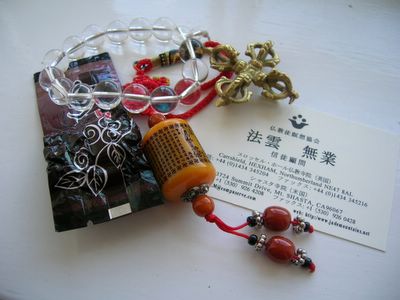We meet on Sunday mornings for meditation and morning service. Afterwards we generally do some working meditation together. Yesterday, and for a few Sundays to come, it was leaf raking the back lawn and pruning the longer branches of a couple of ‘volunteer’ trees growing close to the house wall. (They are probably not doing the foundations of the house much good in the long term when I think about it.) Anyway, we have left the leaves in plastic bags in the garden, with holes punched in them, to over winter for use as mulch in the spring. That will be around…err mid to late March! Afterwards we had ‘tea on the lawn’, a British tradition which my Canadian friends were happy to participate in.

Chris, Terry, Dan and Mike.
Speaking of friends, here is material relating to the subject of friendship in the Dharma that I’d asked about a post or two ago. Thanks to the two adventurous readers who found the quote. Looks like Access To Insight is a good site to remember for references.
Samyutta Nikaya XLV.2
Upaddha Sutta Half (of the Holy Life)
Translated from the Pali by Thanissaro Bhikkhu.
I have heard that on one occasion the Blessed One was living among the Sakyans. Now there is a Sakyan town named Sakkara. There Ven. Ananda went to the Blessed One and, on arrival, having bowed down to the Blessed One, sat to one side. As he was sitting there, Ven. Ananda said to the Blessed One, “This is half of the holy life, lord: admirable friendship, admirable companionship, admirable camaraderie.” “Don’t say that, Ananda. Don’t say that. Admirable friendship, admirable companionship, admirable camaraderie is actually the whole of the holy life. When a monk has admirable people as friends, companions, & comrades, he can be expected to develop & pursue the noble eightfold path. “And how does a monk who has admirable people as friends, companions, & comrades, develop & pursue the noble eightfold path? There is the case where a monk develops right view dependent on seclusion, dependent on dispassion, dependent on cessation, resulting in relinquishment. He develops right resolve … right speech … right action … right livelihood … right effort … right mindfulness … right concentration dependent on seclusion, dependent on dispassion, dependent on cessation, resulting in relinquishment. This is how a monk who has admirable people as friends, companions, & colleagues, develops & pursues the noble eightfold path.
“And through this line of reasoning one may know how admirable friendship, admirable companionship, admirable camaraderie is actually the whole of the holy life: It is in dependence on me as an admirable friend that beings subject to birth have gained release from birth, that beings subject to aging have gained release from aging, that beings subject to death have gained release from death, that beings subject to sorrow, lamentation, pain, distress, & despair have gained release from sorrow, lamentation, pain, distress, & despair. It is through this line of reasoning that one may know how admirable friendship, admirable companionship, admirable camaraderie is actually the whole of the holy life.”
I hope it goes without saying that, while the Buddha is speaking of monks, the practicing of the Eightfold Path with admirable friends is for all who resolve to tread the path of Buddhist practice and choose to do that along side others.


